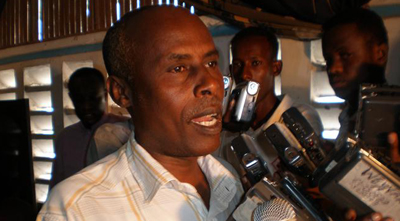
Somalia was among the world’s deadliest countries for journalists in 2009, the year I began working with CPJ’s Journalist Assistance program. On June 7, two gunmen shot Mukhtar Mohamed Hirabe and Ahmed Omar Hashi, the director and news editor of the country’s leading independent station, Radio Shabelle. Hirabe died at the scene. Hashi barely survived and was hospitalized with wounds to the abdomen and right hand.
The following day, JA received an email from Radio Shabelle’s former web editor, Baabul Noor Mohamed, who was living in Uganda. Due to continued threats, Baabul and three colleagues had been evacuated out of Mogadishu in 2007 by JA’s then-coordinator, Elisabeth Witchel. In his email, Baabul asked CPJ to contact his colleague Ahmed Tajir, who had been injured in the recent attack. On establishing contact with Tajir, CPJ learned that doctors believed Hashi needed to leave Somalia for further treatment, and that there had been a second attack on his life inside the hospital. CPJ evacuated Hashi on an African Airways flight to Uganda, where he received medical care and treatment for ongoing trauma.
Over the course of 2009, dozens more journalists fled Somalia. In October, while trying to stay abreast of Somalia’s ever-changing political landscape, I read an online article on Somali journalists Hasan Ali Gesey, Abdul Hakim Omar Jimale,and Mohamed Shidane Daban, who were living in Nairobi. All had survived near-death at home. Ali Gesey, a former editor at Somaliweyn Radio, fled following repeated death threats. Jimale, a veteran reporter for the government-run Radio Voice of Peace, was left for dead after in 2007, after gunmen forced their way into his Mogadishu home and shot him five times. The third, Shidane, survived multiple attempts on his life during his 15 years as a reporter. In 2003, armed men raided his house, spraying it with bullets. Shidane lost his right arm, and his 18-month-old daughter was killed.
A year later, an Al-Shabaab leader threatened to kill him. Shidane went into hiding in Mogadishu and then fled to South Africa. Having returned home, in January 2008, he was arrested by government agents and held without charge for 115 days. This time, a target for both sides of the conflict, Shidane fled to Kenya.
In Kenya, however, Shidane found no reprieve from the threat of violence. In 2010, he produced a series of controversial stories for the German Radio Service ARD and the Kenyan daily The Standard. He uncovered evidence of Al-Shabaab fighters receiving medical treatment in Kenya and reported on the story of a Somali child soldier who escaped a militia training camp. Both stories were immediately followed by renewed death threats. Fearing for Shidane’s safety, ARD staff took him to Nairobi’s Kangethe Rehabilitation Center. There, CPJ covered the cost of his stay as well as medical exams for ongoing pain in the arm Shidane had lost in 2003. Doctors removed a bullet found in what remained of his right arm.
Though Kangethe proved to be a temporary haven, it was not equipped to handle such a high-risk case. All those working on Shidane’s behalf feared that his assailants would soon find him. After discussions with ARD and Kangethe, we agreed that Shidane should be relocated. CPJ’s East Africa consultant, Tom Rhodes, worked his contacts on the ground in Nairobi, while from New York I contacted Amnesty International, the East and Horn of Africa Human Rights Defenders Project, and the United Nations High Commissioner for Refugees. Finally, the U.N. agreed to transfer Shidane to a GTZ facility with 24/7 protection for refugees at high risk.
In the meantime, CPJ pressed the UNHCR for Shidane’s resettlement out of the region, and today, he is living in Sweden. CPJ also supported Jimale’s resettlement to the United States, where he lives near Boston. Ali Gesey was initially turned down for resettlement, but while his case is pending on appeal, CPJ continues to support him.
Shidane recently spoke with CPJ, updating us on his life in Sweden. “I still can’t forget my past,” he wrote. “But here I started to catch up with the life, there is no stress. I can sleep well, there is no fear, no threat. Thank you, you saved my life.”
This entry is part of a series commemorating 10 years of CPJ’s Journalist Assistance program.
